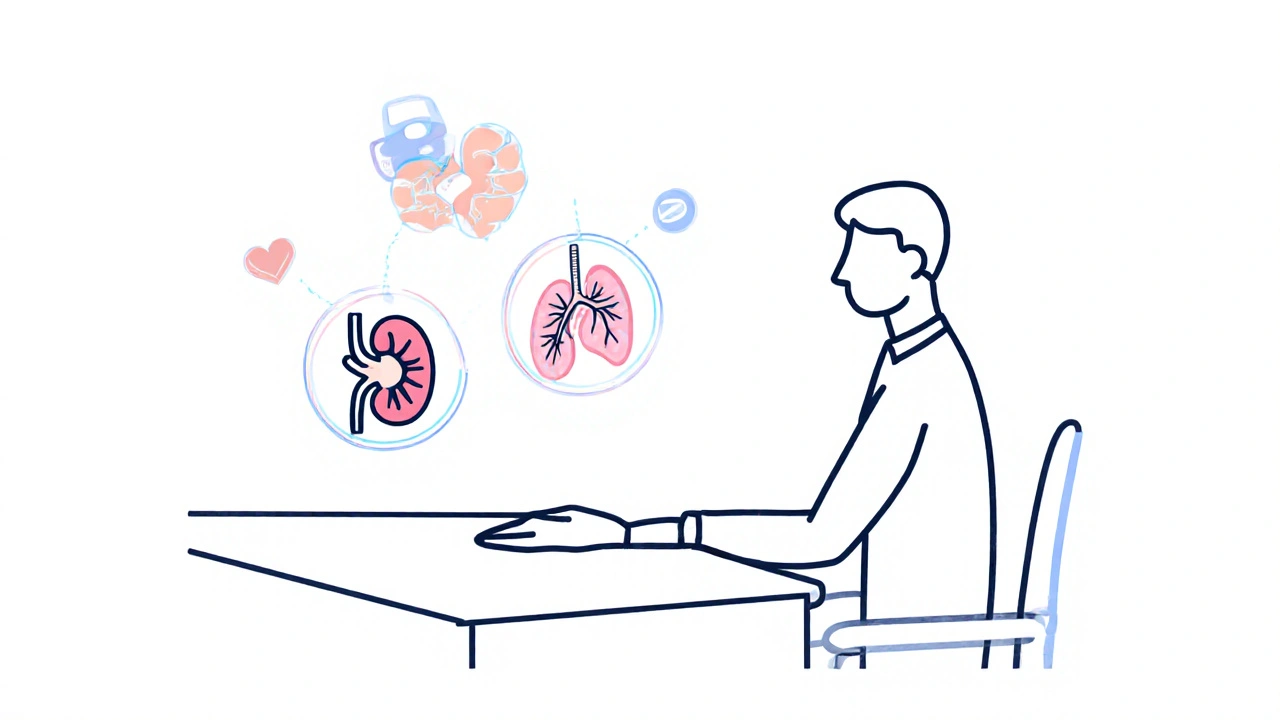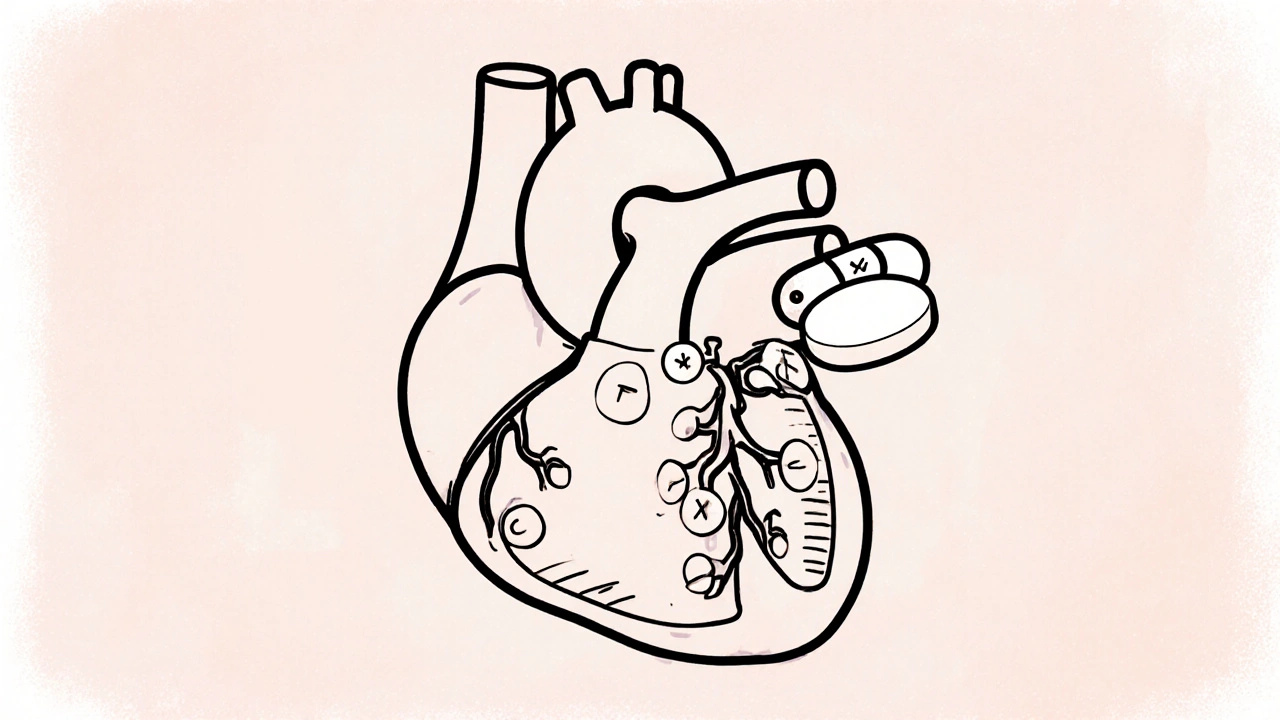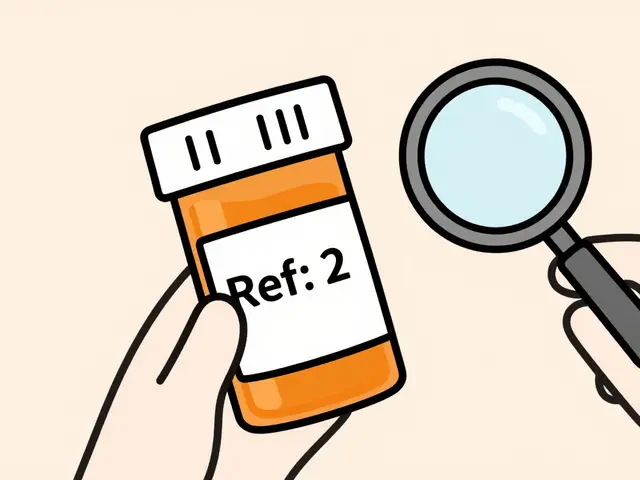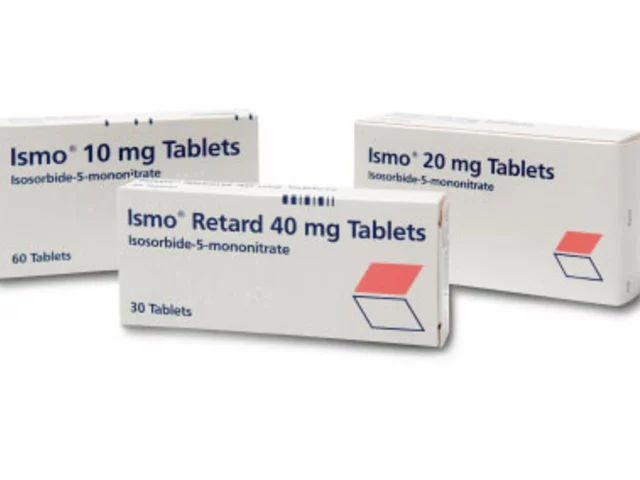When weighing treatment options for high blood pressure or heart failure, Zebeta (Bisoprolol) is a β1‑selective beta‑blocker commonly prescribed to lower heart rate and reduce cardiac workload. It’s known for a relatively long half‑life, which means once‑daily dosing for many patients. If you’re deciding between Zebeta and other options, you’ll want to compare its efficacy, side‑effect profile, and how it fits into your overall health plan.
Key Takeaways
- Zebeta (bisoprolol) is a cardio‑selective β1‑blocker with once‑daily dosing for most indications.
- Atenolol and metoprolol are older β‑blockers; atenolol has a shorter half‑life, metoprolol offers both immediate‑release and extended‑release forms.
- Carvedilol adds α‑blocking activity, making it useful in heart failure but also causing more dizziness.
- Nebivolol provides nitric‑oxide‑mediated vasodilation, which can improve blood‑pressure control with fewer metabolic side effects.
- Choosing the right drug depends on your specific condition, kidney function, and tolerance to side effects.
How Bisoprolol Works
Bisoprolol blocks the β1‑adrenergic receptors in the heart, slowing down the signals that increase heart rate and contractility. By reducing the heart's demand for oxygen, it helps prevent angina and improves survival in chronic heart‑failure patients. Its high selectivity means it spares β2 receptors in the lungs, making it a safer choice for patients with mild asthma or COPD.
Overview of Common Alternatives
Below is a quick snapshot of the most frequently prescribed alternatives. Each entry includes a microdata markup for easy knowledge‑graph integration.
Atenolol is a first‑generation β‑blocker with a short half‑life, often requiring twice‑daily dosing.
Metoprolol comes in immediate‑release (IR) and extended‑release (ER) formulations, offering flexibility for both hypertension and post‑MI patients.
Carvedilol combines β‑blocking with α‑blocking, giving it vasodilatory effects useful in heart‑failure management.
Nebivolol is a newer β1‑selective blocker that also releases nitric oxide, which can improve endothelial function.
Other classes, such as ACE inhibitors (e.g., lisinopril) or calcium‑channel blockers (e.g., amlodipine), are often prescribed alongside or instead of β‑blockers, but they work through entirely different mechanisms.
Detailed Comparison Table
| Brand | Generic | β‑Selectivity | Half‑Life (hrs) | Typical Dose | Primary Indications | Notable Side Effects |
|---|---|---|---|---|---|---|
| Zebeta | Bisoprolol | High β1 | 10‑12 | 5‑10 mg once daily | Hypertension, Heart failure, Post‑MI | Bradycardia, Fatigue, Cold extremities |
| Tenormin | Atenolol | Moderate β1 | 6‑7 | 25‑100 mg once daily | Hypertension, Angina | Sleep disturbances, Depression |
| Lopressor / Toprol‑XL | Metoprolol | Moderate β1 | 3‑7 (IR) / 5‑7 (ER) | 50‑200 mg once or twice daily | Hypertension, MI, Heart failure | Dizziness, Depression, Gastro‑intestinal upset |
| Coreg | Carvedilol | Non‑selective β + α | 7‑10 | 12.5‑25 mg twice daily | Heart failure, Post‑MI | Orthostatic hypotension, Weight gain |
| Biloven | Nebivolol | High β1 + NO release | 12‑20 | 5‑10 mg once daily | Hypertension, Heart failure | Headache, Nasal congestion |
Step‑by‑Step Guide to Picking the Right β‑Blocker
- Identify your primary health goal: blood‑pressure control, heart‑failure management, or post‑myocardial‑infarction protection.
- Check kidney and liver function labs. Drugs like atenolol rely heavily on renal clearance, while bisoprolol and carvedilol are metabolized by the liver.
- Consider comorbidities: asthma favors bisoprolol or nebivolol; diabetes may benefit from nebivolol’s neutral metabolic profile.
- Review dosing convenience. Once‑daily agents (bisoprolol, nebivolol) improve adherence for many patients.
- Discuss side‑effect tolerability with your clinician. If you’re prone to fatigue, carvedilol’s α‑blocking effect may cause more dizziness.
Following these steps helps you work with your doctor to choose a medication that balances efficacy with quality of life.
Side‑Effect Profiles and Drug Interactions
All β‑blockers share some common adverse events: bradycardia, reduced exercise tolerance, and potential bronchospasm in sensitive individuals. However, each drug has nuances.
- Atenolol: More likely to cause sleep disturbances and vivid dreams due to its central nervous system penetration.
- Metoprolol: Can worsen depression in susceptible patients; extended‑release forms reduce peak‑related side effects.
- Carvedilol: α‑blocking leads to orthostatic hypotension, especially when standing up quickly.
- Nebivolol: Generally mild, but nitric‑oxide release can lead to occasional headaches.
Drug interactions matter too. Combining any β‑blocker with calcium‑channel blockers like amlodipine can amplify heart‑rate slowing. Non‑steroidal anti‑inflammatory drugs (NSAIDs) may blunt the antihypertensive effect of β‑blockers.
Special Populations
Elderly patients often benefit from once‑daily bisoprolol or nebivolol because fewer pills reduce the chance of missed doses. Patients with renal impairment should avoid atenolol or adjust its dose, as it is cleared unchanged by the kidneys.
Pregnant or breastfeeding women should use β‑blockers only if the benefit outweighs risk; bisoprolol is categorized as Pregnancy Category C, meaning risk cannot be ruled out. Always consult a specialist before starting.

When to Switch From Zebeta
If you experience persistent fatigue, cold extremities, or a resting heart rate below 50 bpm, your doctor might consider switching to a different β‑blocker or adding a low‑dose diuretic. Some patients transition from bisoprolol to carvedilol when heart‑failure severity increases, as the added α‑blockade improves after‑load reduction.
Frequently Asked Questions
Can I take Zebeta with a diuretic?
Yes, many clinicians pair bisoprolol with thiazide diuretics to achieve better blood‑pressure control. The combination is generally safe, but monitor electrolytes and kidney function.
Is Zebeta better than metoprolol for heart failure?
Both bisoprolol and metoprolol have strong evidence in heart‑failure trials. Bisopolol’s longer half‑life offers once‑daily dosing, which may improve adherence, while metoprolol’s extended‑release form provides similar convenience.
What should I do if I miss a dose of Zebeta?
Take the missed dose as soon as you remember, unless it’s almost time for the next dose. In that case, skip the missed one and continue with your regular schedule. Never double‑dose.
Can I exercise while on Zebeta?
Exercise is encouraged, but start slowly. Beta‑blockers lower maximum heart‑rate, so using a perceived exertion scale rather than heart‑rate zones works better.
Are there any foods I should avoid with bisoprolol?
No specific foods interact with bisoprolol, but high‑salt meals can offset its blood‑pressure benefits. Keep a balanced diet and limit excessive caffeine, which can counteract heart‑rate reduction.
Bottom Line
Choosing a beta‑blocker isn’t a one‑size‑fits‑all decision. Zebeta (bisoprolol) offers cardio‑selectivity and convenient once‑daily dosing, making it a solid first choice for many patients with hypertension or heart failure. Alternatives like atenolol, metoprolol, carvedilol, and nebivolol each bring unique strengths-whether it’s shorter half‑life, combined α‑blockade, or nitric‑oxide‑mediated vasodilation. Align the drug’s pharmacology with your health goals, kidney and liver function, and lifestyle, and always discuss the plan with your healthcare provider.






jessie cole
My dear reader, should you contemplate initiating bisoprolol therapy, consider the elegance of its once‑daily regimen. It spares you the burden of multiple pill boxes, thereby nurturing adherence. Moreover, its β1‑selectivity safeguards pulmonary function, a vital point for those with mild asthma. In the grand theatre of cardiovascular care, it performs a steady, reliable role. I encourage you to discuss these virtues with your clinician, for a personalized plan is the cornerstone of success.
Kirsten Youtsey
The layman's enthusiasm for pharmacologic nuance is as misguided as it is predictable.
Matthew Hall
Picture the drama of a heart that thunders like a drum solo, only to be silenced by a single tablet of Zebeta-that’s the power of bisoprolol, a quiet hero in a noisy world; it tames the rhythm, eases the strain, and lets you reclaim the simple joy of walking up a flight of stairs without feeling like you’re climbing Everest.
barnabas jacob
Yo fam, let’s dive into the pharmaco‑kinetics of bisoprolol: high β1‑affinity, hepatic CYP3A4 metabolism, and a tidy half‑life that keeps the plasma trough smooth. Forget the noisy atenolol, this ain’t no half‑ass drug-its dosing schedule is straight‑up convenient. If ur kidneys are on the fritz, dodge atenolol ’cause it’s cleared renally, but bisoprolol rides the liver train just fine. Bottom line: stay lit on the cardio‑selectivity and keep the side‑effects chill.
Alex Pegg
While many trumpet bisoprolol as the default, I contend that in a hypertensive patient with robust renal function, an older agent like atenolol can be more cost‑effective without sacrificing efficacy. Let the data speak, not the hype.
laura wood
I hear the concerns many patients share about fatigue and cold extremities on bisoprolol; it’s completely normal to feel uneasy when a new medication shifts your baseline. Open dialogue with your healthcare provider can uncover dose tweaks or adjunct therapies that ease those symptoms while preserving the heart‑protective benefits.
Kate McKay
Choosing the right beta‑blocker can feel like navigating a maze, but let’s break it down step by step so you don’t get lost. First, identify what you need most: is it blood‑pressure control, heart‑failure support, or post‑MI protection? If you lean toward heart‑failure management, both bisoprolol and carvedilol have strong evidence, yet bisoprolol offers the convenience of once‑daily dosing which many patients find easier to remember. Second, look at your kidney and liver labs; a reduced renal function nudges you away from atenolol because it hangs around longer in the bloodstream. Third, consider any breathing issues you might have-bisoprolol’s β1 selectivity makes it gentler on the lungs compared with non‑selective agents. Fourth, think about lifestyle: if you travel often or have a hectic schedule, a medication that doesn’t require twice‑daily dosing can reduce the chance of missed doses. Fifth, weigh side‑effects: if fatigue is a deal‑breaker, nebivolol’s nitric‑oxide pathway tends to be less tiring for many users. Sixth, remember drug interactions; combining any beta‑blocker with a calcium‑channel blocker like amlodipine can amplify heart‑rate slowing, so monitoring is key. Seventh, assess cost and insurance coverage; older drugs like metoprolol may be cheaper, but newer agents might be preferred for their metabolic profile. Eighth, never ignore the importance of regular follow‑up appointments where your heart rate and blood pressure can be tracked. Ninth, discuss with your doctor the possibility of starting low and titrating up, which can minimize initial dizziness. Tenth, if you experience persistent bradycardia below 50 bpm, bring it up promptly so a dosage adjustment can be made. Eleventh, keep a symptom diary-note any new fatigue, cold hands, or breathing changes, because these clues help your provider fine‑tune therapy. Twelfth, stay informed about emerging research, as new trials occasionally shift the balance of which beta‑blocker is preferred for specific subpopulations. Finally, remember that the “best” drug is the one that fits your unique health picture, supports your daily activities, and aligns with your personal preferences. Take these points to heart, chat openly with your clinician, and you’ll land on a regimen that feels right for you.
JessicaAnn Sutton
While the preceding exposition admirably catalogs practical considerations, it neglects to cite the pivotal SHIFT‑HF trial data that delineate bisoprolol’s mortality advantage over carvedilol in patients with left‑ventricular ejection fraction below 35 %.
Israel Emory
Indeed, the selection of a β‑blocker demands a multifaceted appraisal, encompassing pharmacodynamics, patient comorbidities, adherence potential, and economic factors; therefore, clinicians should employ a shared decision‑making framework, integrating evidence‑based guidelines, individual risk profiles, and patient preferences, to arrive at an optimal therapeutic choice.
Sebastian Green
I appreciate that thorough approach; in my experience, a calm conversation that respects the patient’s concerns often leads to better adherence and outcomes.
Wesley Humble
Statistical scrutiny reveals that bisoprolol’s hazard ratio of 0.85 in the CIBIS‑II cohort surpasses atenolol’s 0.93, underscoring its superior efficacy; nevertheless, clinicians must remain vigilant for the insidious onset of bradyarrhythmia, a nuance often glossed over in promotional literature 🙄.